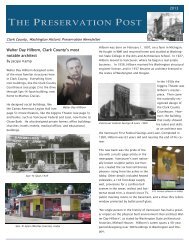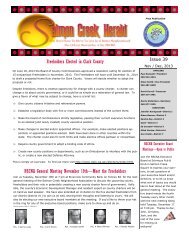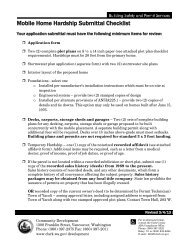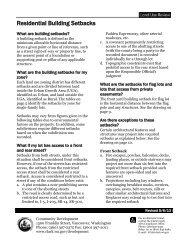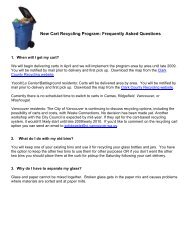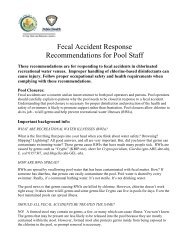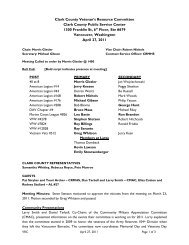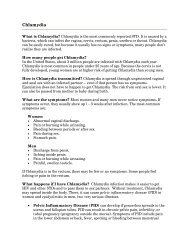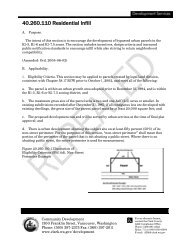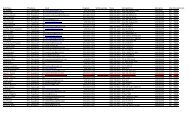Arrange for proper transportation and disposal - Clark County
Arrange for proper transportation and disposal - Clark County
Arrange for proper transportation and disposal - Clark County
You also want an ePaper? Increase the reach of your titles
YUMPU automatically turns print PDFs into web optimized ePapers that Google loves.
<strong>Arrange</strong> <strong>for</strong> <strong>proper</strong> <strong>transportation</strong> <strong>and</strong> <strong>disposal</strong><br />
Be<strong>for</strong>e you send your hazardous waste away.....<br />
There are a few things you should know. The goal of the Dangerous Waste Regulations<br />
(Chapter 173-303 WAC) is to ensure that we manage our hazardous wastes in a manner that<br />
protects our health <strong>and</strong> environment. As a generator of hazardous waste, you have<br />
responsibilities under these regulations <strong>for</strong> the safe <strong>transportation</strong> <strong>and</strong> <strong>disposal</strong> of your wastes.<br />
What is legal?<br />
You should carefully consider your options <strong>for</strong> managing hazardous wastes. Waste reduction<br />
<strong>and</strong> recycling are preferable to <strong>disposal</strong> because they reduce the potential <strong>for</strong> environmental<br />
damage <strong>and</strong> they minimize your liability <strong>for</strong> future problems associated with your wastes.<br />
In addition to the Department of Ecology (Ecology), your trade association, waste haulers <strong>and</strong><br />
management facilities can help you underst<strong>and</strong> your regulatory obligations <strong>and</strong> choose the best<br />
waste management options. When you seek outside help, make sure the source is reliable<br />
<strong>and</strong> legitimate. Cost shouldn't be the only consideration. The generator of waste is liable <strong>for</strong> its<br />
<strong>proper</strong> management, even after the waste is picked up.<br />
Regulated generators, or fully regulated generators typically generate more than 220 pounds<br />
of hazardous waste per month or accumulate more than 2200 pounds of hazardous waste at any<br />
time 1 . Regulated generators must hire a waste transporter that has a RCRA Identification<br />
Number (see Checklist Fact Sheet 2).<br />
Regulated generators must make sure their hazardous wastes are h<strong>and</strong>led at:<br />
• a treatment, storage or <strong>disposal</strong> (TSD) facility that has a permit or is operating under<br />
“interim-status” while the permit application is reviewed, or<br />
• a facility which legitimately recycles or reclaims hazardous wastes.<br />
Small quantity generators never generate more than 220 pounds of hazardous waste per month<br />
OR never accumulate on the premises more than 2200 pounds of hazardous waste. 220 pounds<br />
equals about one-half of a 55-gallon drum. Small quantity generators can send their wastes to a<br />
facility approved by their Local Moderate Risk Waste Plan, such as a:<br />
• permitted moderate risk waste facility;<br />
• municipal or industrial solid waste facility, with local health department approval;<br />
• legitimate recycler; or<br />
• the sanitary sewer, but only with permission from the local sewer utility.<br />
Call your county's solid waste or planning department <strong>for</strong> details.<br />
Wrapping it up.<br />
1 1 or 2.2 pounds of certain pesticides or poisons.
Be<strong>for</strong>e you offer your hazardous waste <strong>for</strong> transport off the premises, you must package, label,<br />
mark, <strong>and</strong> placard the shipment according to the U.S. Department of Transportation’s Hazardous<br />
Material Regulations (49 CFR Parts 172, 173, 178, <strong>and</strong> 179). The transporter <strong>and</strong>/or facility you<br />
select can usually help you choose the required:<br />
• package or container <strong>for</strong> safe transport of the waste;<br />
• diamond-shaped label which identifies the hazardous <strong>proper</strong>ties of the waste (e.g.,<br />
flammable liquid, explosives);<br />
• marking, including the <strong>proper</strong> shipping name <strong>and</strong> number of the waste; <strong>and</strong><br />
• large, diamond-shaped placards <strong>for</strong> the outside of the <strong>transportation</strong> vehicle which<br />
identify the hazardous characteristics of the cargo.<br />
Mark each package or container holding 110 gallons of waste or less with your name <strong>and</strong><br />
address, the Manifest Document Number (see Checklist Fact Sheet 9), <strong>and</strong> the following words:<br />
• Either: "Hazardous Waste State <strong>and</strong> federal law prohibits im<strong>proper</strong> <strong>disposal</strong>."<br />
• Or: "Washington State Dangerous Waste —State law prohibits im<strong>proper</strong> <strong>disposal</strong>."<br />
• And: "If found, contact the nearest police or public safety authority, <strong>and</strong> the Washington<br />
State Department of Ecology or the United States Environmental Protection Agency."<br />
Decisions, decisions.<br />
Don’t <strong>for</strong>get to complete a Uni<strong>for</strong>m Hazardous Waste Manifest if you are a regulated<br />
generator (see Checklist Fact Sheet 9).<br />
Now that you know the legal requirements <strong>for</strong> managing hazardous waste, you’ll need to decide<br />
what makes sense <strong>for</strong> each of your wastes. Disposal is not the only, or the best option. Some<br />
of your wastes may be recyclable, such as antifreeze, solvents <strong>and</strong> spent lead-acid batteries. And<br />
recycling can save you money.<br />
The ideal of course is not to generate the waste in the first place. Waste reduction can be as<br />
simple as keeping hazardous <strong>and</strong> non-hazardous wastes segregated because when they are<br />
mixed, you create a larger volume of hazardous waste. You can get other waste reduction<br />
in<strong>for</strong>mation by:<br />
• Calling <strong>Clark</strong> <strong>County</strong> Environmental Services at 360-397-6118 ext. 4352<br />
• calling Ecology’s Hazardous Substance In<strong>for</strong>mation toll-free hotline at 1-800-633-7585; or<br />
• talking with your trade association, others in the same business or Hazardous Waste<br />
Specialists at Ecology about the legal waste management methods that are best <strong>for</strong> your<br />
wastes.



